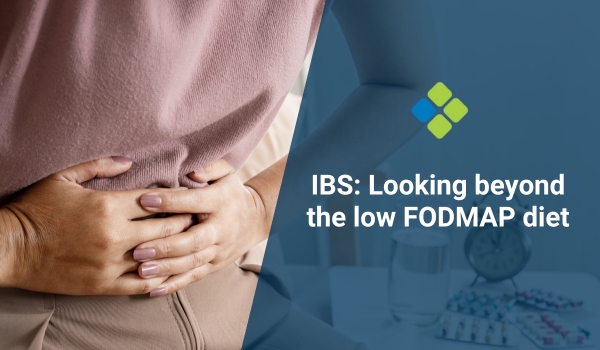IBS: Looking beyond the low FODMAP diet
Learn about the Mediterranean diet and gut directed hypnotherapy for managing irritable bowel syndrome (IBS) in patients not suited to the low FODMAP diet.

HealthCert Education
When you think of management for irritable bowel syndrome (IBS), the low FODMAP diet may be the first thing that comes to mind. Understandably so, since the low FODMAP diet is a highly effective approach with up to 86% of patients who adopt the diet seeing an improvement in gastrointestinal symptoms [1]!
Learn more about this topic in the HealthCert Professional Diploma program in Medical Nutrition Management – online nutrition training for GPs.
While the low FODMAP diet may be an effective approach for IBS symptoms, the research is unclear on its effect on other markers of health such as quality of life and long-term effects on the gut microbiota [2].
Additionally, the low FODMAP isn’t effective for everyone, it can be difficult to follow, and it may not be suitable for some patients such as those with a history or disordered eating [3].
Fortunately, there are alternative dietary and lifestyle approaches which have the potential to manage IBS symptoms as well as improve quality of life, and/or support a healthy gut microbiota.
The Mediterranean diet
The Mediterranean diet is a dietary pattern that emphasises vegetables, fruits, whole grains, nuts, seeds, legumes, and oily fish while limiting red meat and ultra-processed food. It’s one of the most well-researched diets worldwide and is currently considered one of the healthiest dietary models, with benefits including a reduced risk of cardiovascular disease, type 2 diabetes mellites, and some types of cancer [4].
There is growing evidence that the benefits of the diet may extend to improving IBS symptoms including symptom severity, reduced abdominal pain and improved stool quality [5,6]. In fact, there is increasing research that it may be equally effective as the low FODMAP diet in reducing IBS symptoms without reducing quality of life while being easier to follow [5,7].
Another benefit of the Mediterranean diet is that it may improve mental health. Growing research has found that when undertaking the diet, individuals have shown a reduction in symptoms of depression and anxiety [8]. Given that roughly 50-90% of people who suffer from IBS also suffer from one or more mental health condition, the Mediterranean diet may be a suitable approach for this population [9].
Gut-directed hypnotherapy
Gut-directed hypnotherapy is becoming increasingly popular as an IBS management strategy. It involves hypnosis through relaxation and visualisation exercises that guide an individual into a focused state of awareness. Suggestion, imagery, and relaxation are all used to help control gastrointestinal function.
Gut-directed hypnotherapy addresses the miscommunication between the brain and the gut. While the mechanisms are not fully understood, it’s been shown to improve gut motility and reduce sensitivity and have long-term benefits which may improve IBS symptoms by 70-80% [10]. It has also been shown to have a calming therapeutic effect which can reduce stress levels, depression, anxiety, and improve quality of life [10].
While the low FODMAP diet is an effective approach for managing IBS symptoms, understanding alternative approaches can allow GPs to provide the best care to patients whom the diet may not be suitable for, who find it difficult to stick to, or potentially those who also suffer from mental health conditions.
Learn more with the online HealthCert Professional Diploma program in Medical Nutrition Management.
– Sarah Marko, Accredited Practising Dietitian
Read another blog: Medical nutrition & nightshades: A look at the evidence
References
[1] Nanayakkara WS, Skidmore PM, O'Brien L, Wilkinson TJ, Gearry RB. Efficacy of the low FODMAP diet for treating irritable bowel syndrome: the evidence to date. Clin Exp Gastroenterol. 2016 Jun 17;9:131-42. doi: 10.2147/CEG.S86798. PMID: 27382323; PMCID: PMC4918736.[2] Dale HF, Lorentzen SCS, Mellin-Olsen T, Valeur J. Diet-microbiota interaction in irritable bowel syndrome: looking beyond the low-FODMAP approach. Scand J Gastroenterol. 2023 Jun 29:1-12. doi: 10.1080/00365521.2023.2228955. Epub ahead of print. PMID: 37384386.
[3] Hill P, Muir JG, Gibson PR. Controversies and Recent Developments of the Low-FODMAP Diet. Gastroenterol Hepatol (N Y). 2017 Jan;13(1):36-45. PMID: 28420945; PMCID: PMC5390324.
[4]Papadaki A, Nolen-Doerr E, Mantzoros CS. The Effect of the Mediterranean Diet on Metabolic Health: A Systematic Review and Meta-Analysis of Controlled Trials in Adults. Nutrients. 2020 Oct 30;12(11):3342. doi: 10.3390/nu12113342. PMID: 33143083; PMCID: PMC7692768.
[5] Paduano D, Cingolani A, Tanda E, Usai P. Effect of Three Diets (Low-FODMAP, Gluten-free and Balanced) on Irritable Bowel Syndrome Symptoms and Health-Related Quality of Life. Nutrients. 2019 Jul 11;11(7):1566. doi: 10.3390/nu11071566. PMID: 31336747; PMCID: PMC6683324.
[6] Di Rosa, Claudia. The role of different dietary patterns on irritable bowel syndrome (IBS) symptoms. Università Campus Bio - Medico di Roma. 2023 Mar 20.
[7] Dale HF, Lorentzen SCS, Mellin-Olsen T, Valeur J. Diet-microbiota interaction in irritable bowel syndrome: looking beyond the low-FODMAP approach. Scand J Gastroenterol. 2023 Jun 29:1-12. doi: 10.1080/00365521.2023.2228955. Epub ahead of print. PMID: 37384386.
[8] Jacka FN, O'Neil A, Opie R, Itsiopoulos C, Cotton S, Mohebbi M, Castle D, Dash S, Mihalopoulos C, Chatterton ML, Brazionis L, Dean OM, Hodge AM, Berk M. A randomised controlled trial of dietary improvement for adults with major depression (the 'SMILES' trial). BMC Med. 2017 Jan 30;15(1):23. doi: 10.1186/s12916-017-0791-y. Erratum in: BMC Med. 2018 Dec 28;16(1):236. PMID: 28137247; PMCID: PMC5282719.
[9] Zamani M, Alizadeh-Tabari S, Zamani V. Systematic review with meta-analysis: the prevalence of anxiety and depression in patients with irritable bowel syndrome. Aliment Pharmacol Ther. 2019;50(2):132-43.
[10] Black CJ, Thakur ER, Houghton LA, Quigley EMM, Moayyedi P, Ford AC. Efficacy of psychological therapies for irritable bowel syndrome: systematic review and network meta-analysis. Gut. 2020 Aug;69(8):1441-1451. doi: 10.1136/gutjnl-2020-321191. Epub 2020 Apr 10. PMID: 32276950.

 1800 867 1390
1800 867 1390





